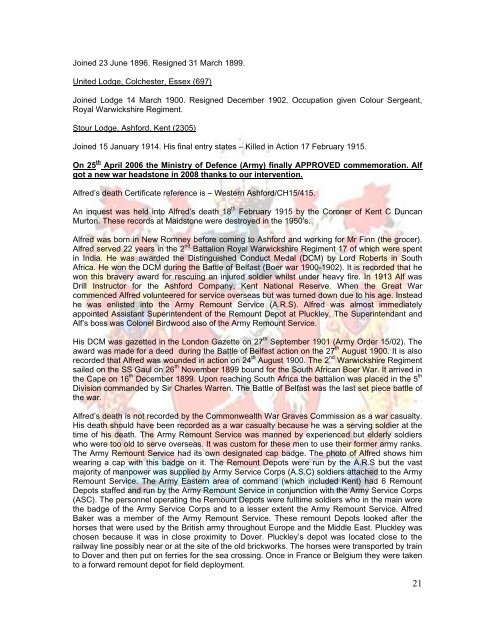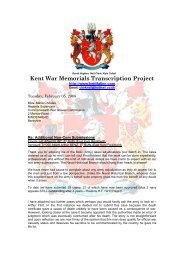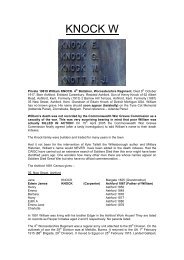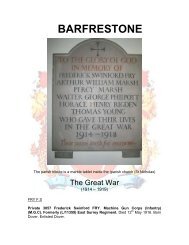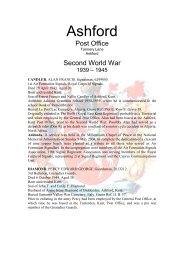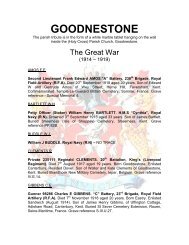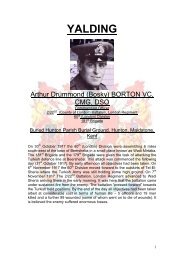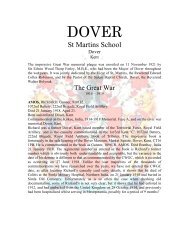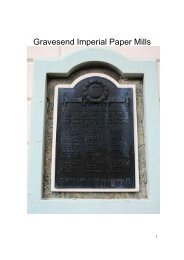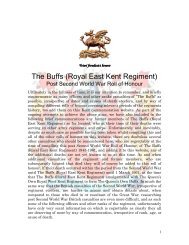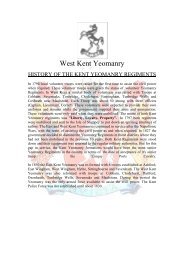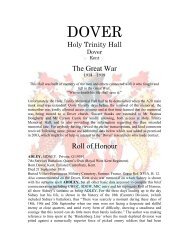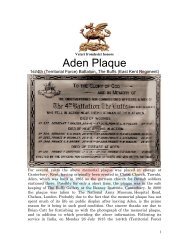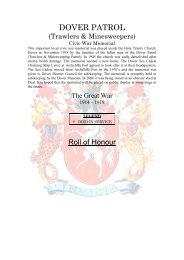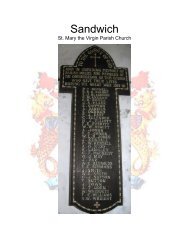Create successful ePaper yourself
Turn your PDF publications into a flip-book with our unique Google optimized e-Paper software.
Joined 23 June 1896. Resigned 31 March 1899.<br />
United Lodge, Colchester, Essex (697)<br />
Joined Lodge 14 March 1900. Resigned December 1902. Occupation given Colour Sergeant,<br />
Royal Warwickshire Regiment.<br />
Stour Lodge, Ashford, <strong>Kent</strong> (2305)<br />
Joined 15 January 1914. His final entry states – Killed in Action 17 February 1915.<br />
On 25 th April 2006 the Ministry of Defence (Army) finally APPROVED commemoration. Alf<br />
got a new war headstone in 2008 thanks to our intervention.<br />
Alfred’s death Certificate reference is – Western Ashford/CH15/415.<br />
An inquest was held into Alfred’s death 18 th February 1915 by the Coroner of <strong>Kent</strong> C Duncan<br />
Murton. These records at Maidstone were destroyed in the 1950’s.<br />
Alfred was born in New Romney before coming to Ashford and working for Mr Finn (the grocer).<br />
Alfred served 22 years in the 2 nd Battalion Royal Warwickshire Regiment 17 of which were spent<br />
in India. He was awarded the Distinguished Conduct Medal (DCM) by Lord Roberts in South<br />
Africa. He won the DCM during the Battle of Belfast (Boer war 1900-1902). It is recorded that he<br />
won this bravery award for rescuing an injured soldier whilst under heavy fire. In 1913 Alf was<br />
Drill Instructor for the Ashford Company, <strong>Kent</strong> National Reserve. When the Great War<br />
commenced Alfred volunteered for service overseas but was turned down due to his age. Instead<br />
he was enlisted into the Army Remount Service (A.R.S). Alfred was almost immediately<br />
appointed Assistant Superintendent of the Remount Depot at Pluckley. The Superintendant and<br />
Alf’s boss was Colonel Birdwood also of the Army Remount Service.<br />
His DCM was gazetted in the London Gazette on 27 th September 1901 (Army Order 15/02). The<br />
award was made for a deed during the Battle of Belfast action on the 27 th August 1900. It is also<br />
recorded that Alfred was wounded in action on 24 th August 1900. The 2 nd Warwickshire Regiment<br />
sailed on the SS Gaul on 26 th November 1899 bound for the South African Boer War. It arrived in<br />
the Cape on 16 th December 1899. Upon reaching South Africa the battalion was placed in the 5 th<br />
Division commanded by Sir Charles Warren. The Battle of Belfast was the last set piece battle of<br />
the war.<br />
Alfred’s death is not recorded by the Commonwealth War Graves Commission as a war casualty.<br />
His death should have been recorded as a war casualty because he was a serving soldier at the<br />
time of his death. The Army Remount Service was manned by experienced but elderly soldiers<br />
who were too old to serve overseas. It was custom for these men to use their former army ranks.<br />
The Army Remount Service had its own designated cap badge. The photo of Alfred shows him<br />
wearing a cap with this badge on it. The Remount Depots were run by the A.R.S but the vast<br />
majority of manpower was supplied by Army Service Corps (A.S.C) soldiers attached to the Army<br />
Remount Service. The Army Eastern area of command (which included <strong>Kent</strong>) had 6 Remount<br />
Depots staffed and run by the Army Remount Service in conjunction with the Army Service Corps<br />
(ASC). The personnel operating the Remount Depots were fulltime soldiers who in the main wore<br />
the badge of the Army Service Corps and to a lesser extent the Army Remount Service. Alfred<br />
Baker was a member of the Army Remount Service. These remount Depots looked after the<br />
horses that were used by the British army throughout Europe and the Middle East. Pluckley was<br />
chosen because it was in close proximity to Dover. Pluckley’s depot was located close to the<br />
railway line possibly near or at the site of the old brickworks. The horses were transported by train<br />
to Dover and then put on ferries for the sea crossing. Once in France or Belgium they were taken<br />
to a forward remount depot for field deployment.<br />
21


